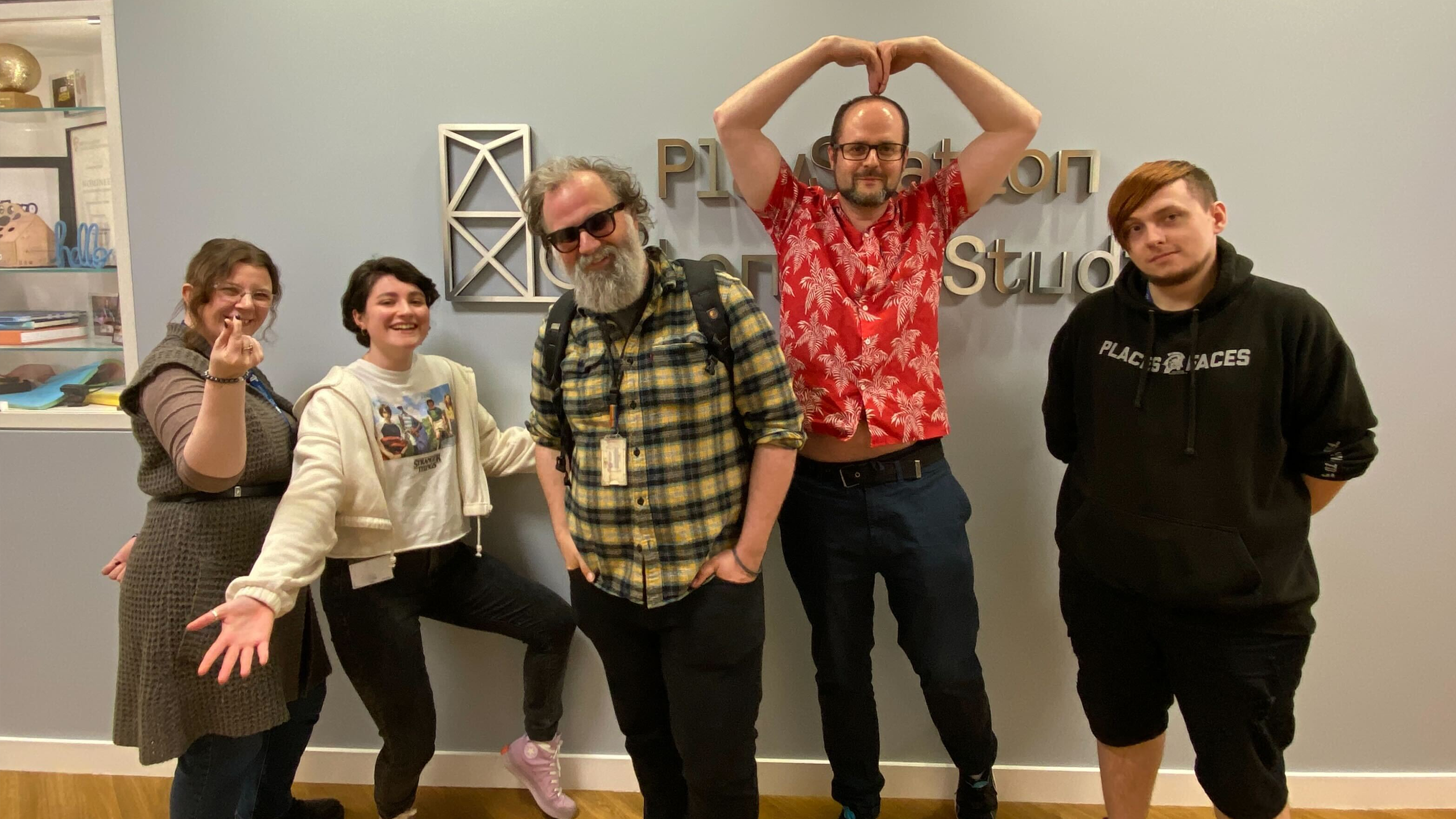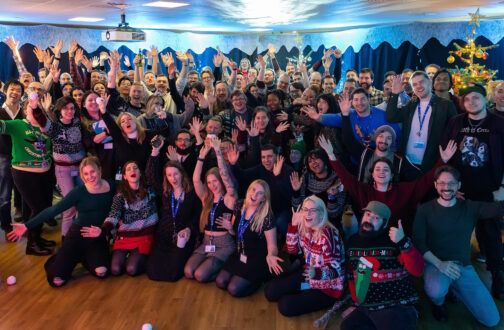
Meet our Development Support team!
09/08/2022
We’ve renamed our QA team to Development Support to reflect the work they do more accurately. Their roles are incredibly diverse, yet there are many misconceptions about QA related roles in the games industry. So, we’ve caught up with our Dev Support team to share more about what they do, how they got their first jobs and an understanding of why this name change matters.
Hi Paul, Lindsay, David, Lara and Kane! Thanks for chatting with us! Let’s start with a bit about what you all do at the studio:
Paul: I’m the Dev Support Manager here! I manage the Dev Support team as a whole and oversee the work they do across all projects.
Lindsay: I’m the Dev Support Lead on the gameplay team!
David: I’m a Dev Support Lead too, but more so on the technical side.
Lara: My role is Junior Dev Support!
Kane: I’m Senior Dev Support! I work on the tech side of things, mostly with our game engine and tools.
Ok, cool – so give us a taste of your role… what’s the primary purpose of Dev Support?
Kane: It’s our responsibility to identify, raise risks, and manage them.
Lara: …and assist the team!
Lindsay: Exactly! Developers make it, and we break it! We’re the first and last line of defence between the dev team’s work and the awaiting players. It’s our job to make sure the game lives up to the expectations of both the players and the devs.
Paul: That’s a good way of putting it. In my role directly, I plan testing and dev support work long term. To me the primary purpose of QA is to help improve the quality of the game. This is done by testing the game to ensure we catch and find bugs and issues so that they can be fixed prior to launch. But, with Dev Support, it’s all of this and more. We are much more integrated with the rest of the studio as we also assist in development and help build the game.
David: Exactly. Our job is to help test the tools prior and during deployment, but we’re also here to bounce ideas and other features off! We can support the wider team when they have issues with a wide range of information and analytics.
Lara: This is actually my first games industry job, and what I love about the Dev Support set up is that I get to see how everything works, the things that could (and will) go wrong and the process to fix it. I’ve already learned so much as we don’t always have guides on certain things. I’ve had to put my problem-solving skills to use, but I often also learn from talking to people from other departments as I have to ask around to figure things out.
Got it… but is Dev Support still QA though? Why the name change?
Paul: It’s QA plus! Dev Support is an evolution of the QA role with additional responsibilities and opportunities. We realised that QA didn’t fully sum up the work we do. Naturally as time has gone on the team have become more integrated with the development of our games and have started taking on more responsibilities outside of just testing. We wanted a name change that would better represent what we do and allow us to evolve.
Kane: Yeah. As an example, we do run testing; however, we can also do so much more. We can offer comparative analysis where we compare a feature’s implementation across the industry (for example, seeing what accessibility options games do and don’t offer). This can be useful information early in the development process. We can also run play tests where we gather feedback from an unbiased group of people to relay this back to the team so they can make the relevant changes based on the information! We have even offered the potential of fixing some low-level issues ourselves so that the devs get to spend more time on the issues that matter most!
Lindsay: When people think of QA they think of testers sitting in rows, following test plans, and playing the same level over and over again. Whereas we certainly do that, but as you can see from Kane’s example – it’s only a small facet of what we do.
David: We’re a force multiplier. We support our devs and make their lives easier where we can.
That’s really interesting and makes a lot of sense. So how does the name change personally make you feel then?
Lindsay: “QA” as a title has a lot of negative baggage, and it’s quite refreshing to be free of that. I can focus on doing my job, rather than justifying it!
David: Yeah… having been in the industry for a while, QA get a rough treatment. Here at London Studio, we’re not just here for assuring quality, but supporting the entire development process.
Paul: This is a fresh start. A launch pad for evolving how we work.
Kane: Exactly. That’s why it means quite a lot! Our friends at Insomniac Games and Naughty Dog do it similarly too, so it’s great that PlayStation Studios is committed to letting us modernise the QA role for a new generation. It feels awesome to be an early adopter and set the baseline for what Dev Support could be for others in the future!
Where do you see the Dev Support team in a few years’ time then? What’s your vision?
Paul: The work we do will continue to evolve based on the studio needs. Part of what excites me is that there will be some parts of the job we cannot predict, so I’m excited to be on a journey that isn’t always clearly defined!
Lindsay: I’d also like to create an environment where testers can showcase their own skills and interests. QA is often seen as a gateway job into the industry, so a lot of people here have dreams and talents to be artists, designers, programmers. These are skills and interests that should be showcased and developed, not hidden away because it’s “not your job”. The end goal is to have testers pairing up with the devs in the teams that interest them the most. This way, they can develop those interests whilst supporting the dev outside of just testing the game!
Kane: Outside of London Studio, I’m hoping that other studios see the value in their existing QA teams. I hope they grow to understand the fact that they can offer so much more than strictly testing.
David: Yes, personally I would like to see more roles of this type come up industry wide.
Alright, so we’ve talked a bit about how QA can get a rough ride sometimes. What are some of the common myths or misconceptions about the role of QA/Dev Support – and can you clear some of them up?
All: The biggest one is “you just play games all day, right?”
Lara: My cousins think I play polished, ready-to-ship videogames for a living :’) this is sadly not the case! The truth is we test tools, figure out what is broken, read and create a lot of Jira tickets… and we attend many meetings.
Paul: Yeah, testing and playing are two different things. Testing focusses on ensuring that the game works in the way it was intended. But, that’s not all we do. We conduct research into game features and other games, learn how to use content creation tools and game engines, conduct playtest/give qualitative feedback and assist in investigating the cause of issues.
Lindsay: It’s also worth understanding that when we are “playing” the game, it’s not finished or polished and wonderful! It’s broken and messy, often with huge chunks missing, and you must go over the same bit over, and over again. Remember the last game breaking bug you found? Imagine that was happening every fifteen minutes and you can’t just put it down and wait for a patch. “Just playing” is the wrong approach to think about what we do.
Kane: Our roles are also highly pressurised and analytical. There has been a lot of stigmas unfairly attached to it for quite a long time. It’s arguably one of the most important parts of the development cycle, as without adequate quality checks and constant risk analysis, games will release in an unplayable state.
David: I’ve heard “QA are not developers” a few times too. This is such rubbish. Great developers use their QA/Dev Support teams for feedback and many other insights! Why not use the resource that thoroughly tests your game anyway? Chances are you can make substantial changes through our help.
Kane: I also want to add that people sometime refer to, QA as just a “foot in the door” into the games industry. Whilst yes, it is a reliable way into the games industry, a lot of people stay in QA/Dev Support because they like the role. There is a lot of job progression in Dev Support! You can grow into Senior and Lead roles.
Talking about job progression – how did you all start your career in games?
Paul: Well to start, I want to mention that although a lot of us went to university, having a degree is absolutely not a requirement if you wanted to join the Dev Support team at London Studio. Yes, we all had university experience before getting our first jobs but that isn’t something we look for when hiring new candidates. You can learn about games development through other means and free resources/tools.
Kane: For me, I had been studying games development in college for a while, however I originally started working in the games industry whilst I was studying for a Game Design diploma in university. A good friend of mine (yo, Seb!) recommended that I apply for a job working with him as a Functional Tester for PlayStation Studios QA in Liverpool. I got to work on games like Detroit: Become Human, Erica and I even worked a few months on-site in London for Blood & Truth. After I graduated, it was my work with London Studio on Blood & Truth that landed me my role working full time.
Lara: As I mentioned earlier, this is my first games industry job! I studied Games Design and Development at university and worked on said course after I graduated assisting lecturers and students. I also freelanced for a while as a 3D artist and took part of a mentorship program where I was paired up with an industry professional. After that I applied for my current role here… and the rest is history.
Paul: I started my career 14 years ago with my first job in QA. I was nearing the end of my studies and was starting to think about the future and how I could get into the games industry. I started working before I finished my studies, so I had to juggle my final year with a full-time job. It was busy! Before that, I know I’ve loved games since I first played Super Mario Bros when I was 4 years old. You could say that was the moment my career was cemented. Growing up I got interested in reading game magazines and started becoming aware of who was making games and why. It really fascinated me to hear that Shigeru Miyamoto drew on inspiration from playing in caves as a child when creating The Legend of Zelda franchise. At that moment I realised that people made games and started to think that’s what I wanted to do too.
Lindsay: Short answer? Got my degree, found a list of “100 best games studios in the UK” and got applying. Long answer? After graduating I got a short contract QA job pretty quickly, but it was only for a few months. After that my second job took a lot longer to find! Some QA jobs can have short contracts, so I ended up in a few different places, working on lots of different games. I had to stay flexible and proactive. Nowadays more companies offer more permanent roles. Here at London Studio we offer a minimum contract of 18 months for Junior Dev Support Roles and offer longer contracts for all other roles.
David: I started working at Eidos on championship manager around 2005! Working as a production QA was a pretty rough at the time, but I met some great people who I will always be grateful for meeting.
So what kind of career progression can you have in Dev Support? Can you give us an idea of the different roles that exist?
Paul: We’re keen on promoting growth and progression within the team, so we have a range of roles, all with different responsibilities:
– Junior Dev Support is our entry level role and here you will mostly be testing and following test plans.
– Dev Support is the base role and here you will be working directly with development teams, joining their meetings and writing test plans for those areas.
– Senior Dev Support then takes on more responsibility such as mentoring and training of others. As well as delegating tasks to other members of the team.
– Lead Dev Support have ownership over a whole project and do line management.
– Dev Support Manager leads, manages and handles long term planning and team processes.
David: Within these roles it can also be quite varied. For example, I work on the tech side, so I work on organising the testing on the tools side of development. This includes testing the game engine and other art tools the team uses to create titles. On the tech side, depending on your aptitude we assign different areas of the tooling to look after. This helps build a solid technical understanding if you wanted to branch out in other areas.
Lindsay: Yeah – we have opportunities to work with other departments, so if you’re looking to move laterally into another department, we can help you prepare and train for that.
Kane: That’s what’s really cool about Dev Support. There’s always bandwidth to work in other areas of game dev that interest you. If you wanted to become a level designer, you can align your workload with your goals by working closely with the design team and owning testing in those areas. The same idea could easily apply to other roles, such as tech design, coding, art, etc.
But there is also progression if you wish to push your skills more towards improving test processes (internal or external) or even working closer with the Production team. There’s plenty of options and we always support each other when it comes to attaining personal goals whilst keeping them in line with the needs of the project.
Interesting! So, if someone is reading this and wants to get into Development Support, what are the kinds of skills they need to have?
David: Critical thinking, analytics, problem solving and a lot of soft skills. In fact, soft skills are some of our most important skills. You might be working with people having a bad day because you’re looking for the source of a tricky problem. This means you need to have a high degree of emotional intelligence, understanding and communication. Always question if there’s a better way, never worry about learning something new or pushing what you know further. Process should never be finished, always try and drive efficiency.
Lara: Communication, communication, communication. But also, organisational skills, problem solving and thinking on your feet.
Lindsay: I’d agree with that! You must also have:
– A keen eye for detail. It’s your job to spot issues, you need to be good at noticing things.
– Problem solving ability. You still need to test the game even if bugs block large sections of contacts. How can you get around the bugs?
– Assessment. Often, we’re asked to test features that have only just been invented, there is no guide on how to test them already on the internet, you can’t look up the best method. So being able to look at what’s being asked and work it backwards is a vital skill. What needs testing, and how?
– Patience. The game is broken, that’s why you’re here. How do you feel when an app you use is suddenly broken, or that game you wanted to play has no active servers? Imagine that, but it’s your job to sit there and not let it stop you.
Paul: As Dave, Lara and Lindsay have said, communication skills (both written and verbal) and being good at problem solving are key. I’d also add that you need to be inquisitive and wanting to learn – and importantly have a passion for games.
Kane: Yes! First and foremost, a passion for games. Loving games and the craft behind them will drive you forward. I agree, being inquisitive is quite a good one to have too, wanting to get to the bottom of things, and find the root causes of issues etc. Also, don’t forget to think outside of the box when coming up with new ways to break stuff.
What about or someone who is still at school age, what kind of things should they be doing to increase their chances of getting a role in Development Support?
Lindsay: Focus on strong, broad GCSE’s (these are the qualifications obtained by fifteen and sixteen year olds in the UK, so otherwise whatever the equivalent exam is in your country!) You have no idea what kind of game you’ll be expected to test so a good broad knowledge of history and geography, for example, means that you can test anything set in the real world with more confidence and knowledge. Subjects that focus on tech, such as IT or programming are also fantastic. Like most tech jobs, you’ll be working heavily with computers, both to run the game and to handle all your job responsibilities. You might also consider art, drama, or music if those are parts of the industry you are interested in. Just because those subjects may never mention video games, that doesn’t mean there isn’t a lot of transferable skills and advice between more traditional media and games.
Lara: Try your best to learn a general understanding of game development. Even if it isn’t very in depth, knowing about the different areas that are involved in creating a game goes a long way! There are lots of resources, books, talks etc on this.
Paul: Playing games can really help. Recognise the games you like and think about what makes them good. Even more importantly, think about the games you don’t like and think about what parts don’t work and what they could do to make them better. Knowing how games work and how mechanics interact with each other really helps. Written skills are important, so practice writing instructions for others as it can really help when it comes to bug reporting. Learning about game development tools will also give you a huge advantage. We use a lot of tools and game engines for testing.
David: Yeah – learning about tools is a good tip. Download Unity or Unreal and start watching YouTube. There is so much information now, it’s awesome! If you want, there are also tools out there now to help you make games. If you choose to do that, then understand when they break and identify how they can be fixed. Otherwise, it’s worth emailing some developers to see if you can help, especially if you approach some indie studios. You’ll get a sense of how games are made.
Kane: Keep loving games. But, whilst you’re doing that, think about things a little bit more. What kind of “building blocks” are being used to put your favourite games together? It can’t hurt to start learning a bit more about the development side of things, but at this point of your life, don’t feel like you must go on a thousand-year spiritual journey across all lands to become a mad programmer or unstoppable artist straight away. Just let your passion for games continue to shine through!
Also, remember there are plenty of opportunities to study games, for example, in college.
Amazing, thank you so much for your time!
If you’d like to join the London Studio team, take a look at our open roles, here!
Related Posts
Celebrating Our Studio’s Best Place to Work Award
September 27, 2023
Celebrating Our Studio’s Best Place to Work Award

Breaking Barriers: In Conversation with Tara Saunders, Co-Studio Head
March 8, 2023
Breaking Barriers: In Conversation with Tara Saunders, Co-Studio Head

Reflecting back on 2022
December 15, 2022
Reflecting back on 2022
